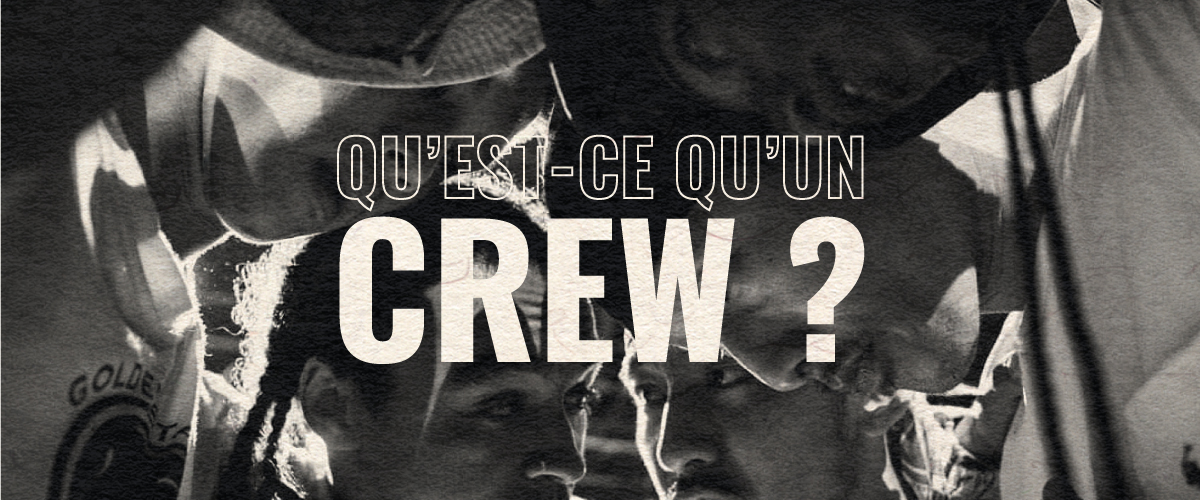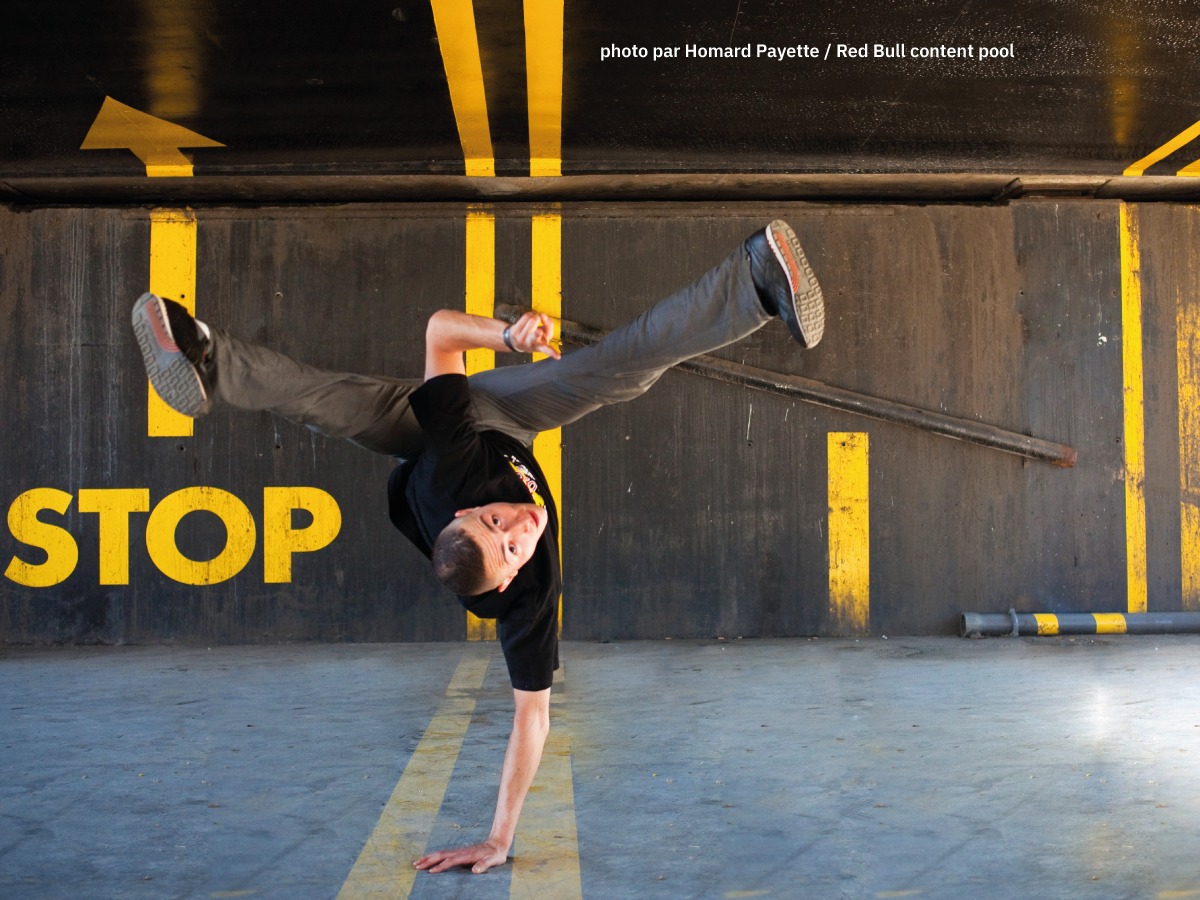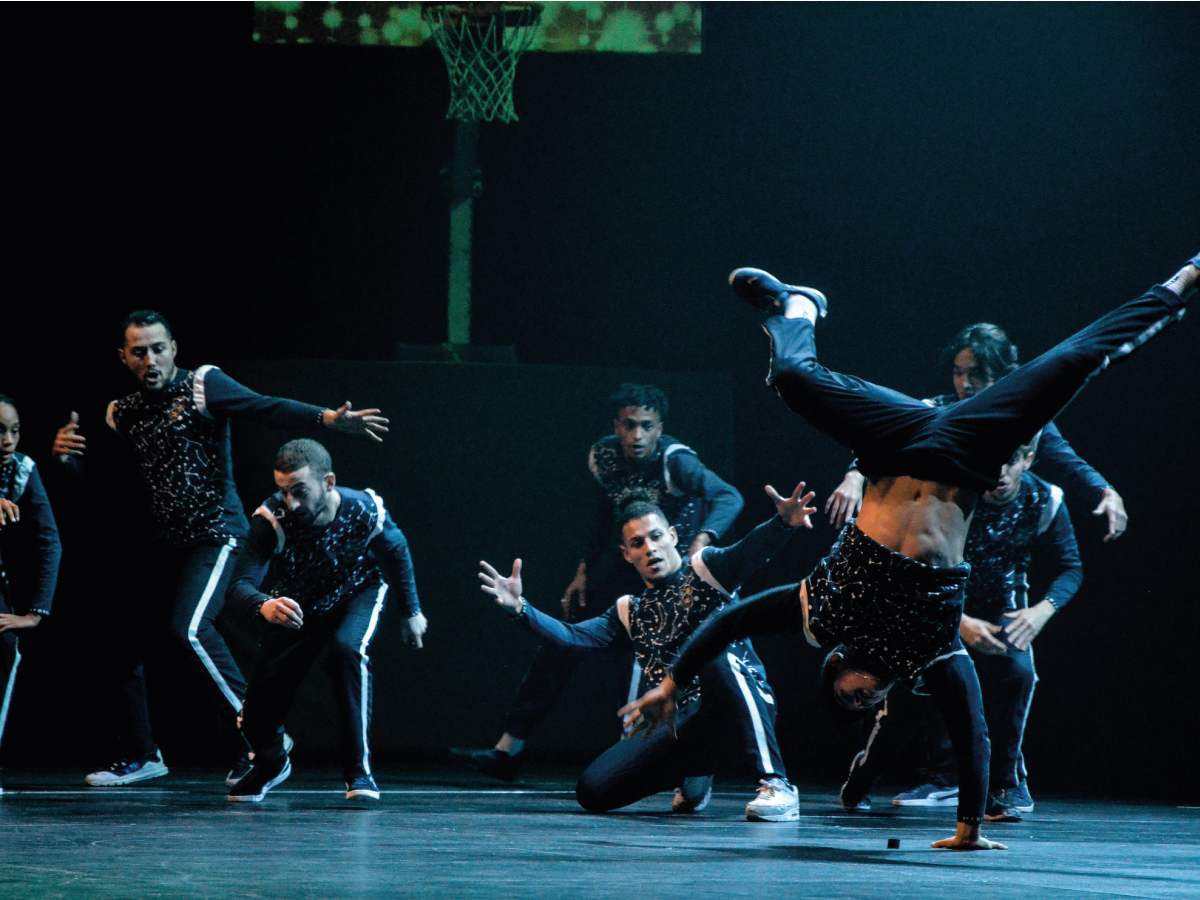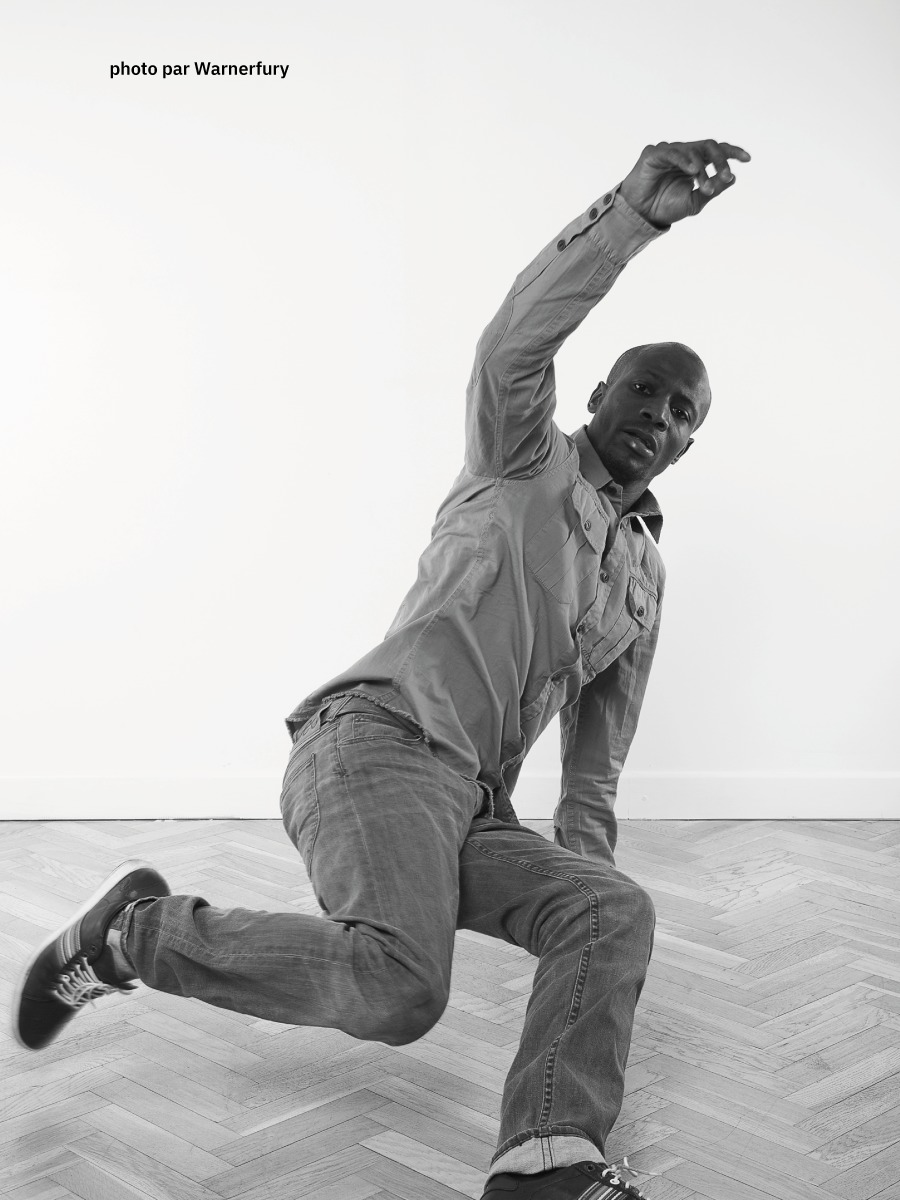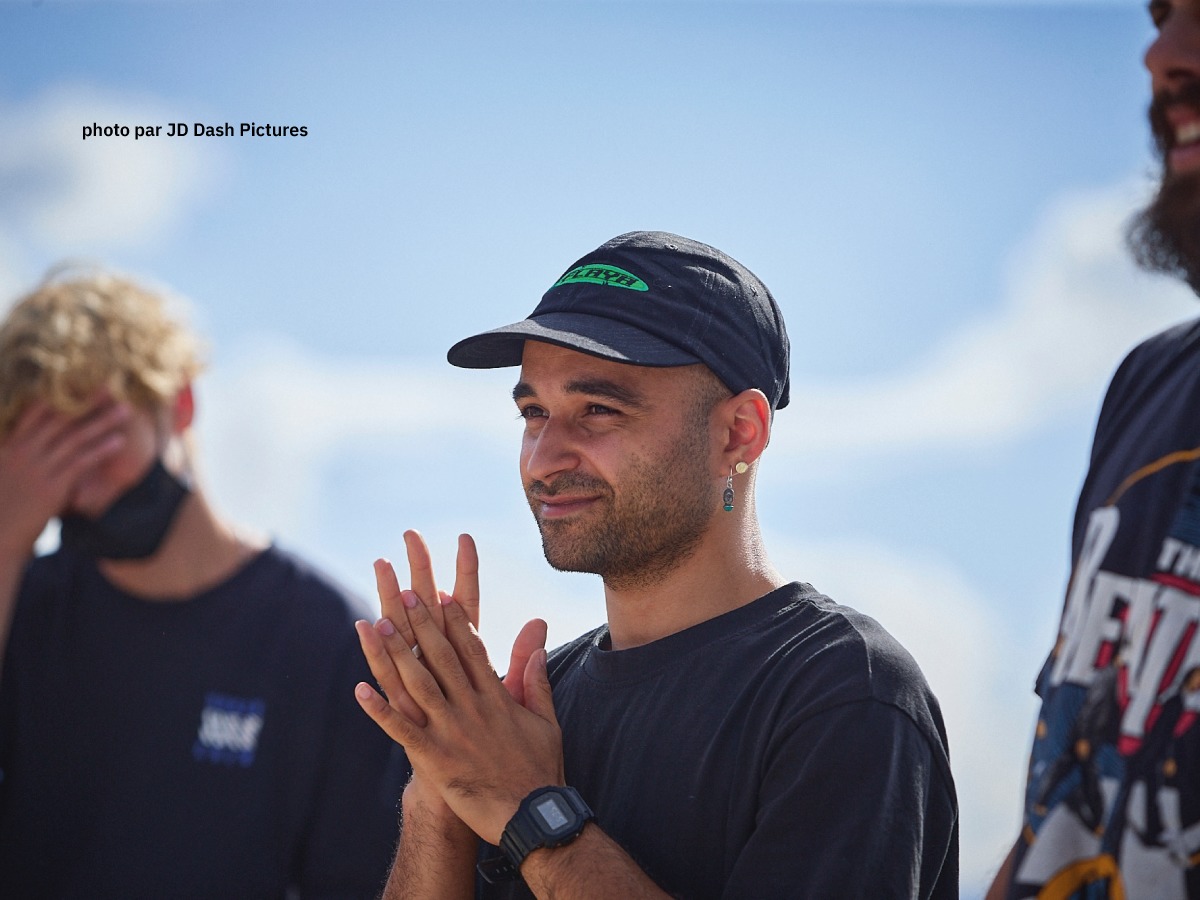Talks #2 – Qu’est-ce qu’un crew ?
MOUNIR – VAGABOND CREW
« Un crew, de manière théorique est un rassemblement de personnes au sein d’une entité à laquelle on donne un nom. Mais en réalité c’est une famille. C’est véritablement ce qui fait notre identité à chacun. Un crew, ce sont les personnes avec qui tu partages des projets personnels, professionnels, artistiques, sportifs. Ce sont les gens, après ta vraie famille, avec qui tu passes le plus de temps.
J’ai commencé la danse à Angers en 1997. Nous avons monté un premier groupe avec des danseurs de toute la ville quand j’avais 15 ans, eux avaient entre 19 et 20 ans. Nous étions une compagnie amateure, avec l’ambition de devenir professionnels. C’était ma première petite famille, la première pierre à l’édifice.
Suite à cela j’ai nourri des ambitions plus élevées, ou différentes de celles des autres membres de mon crew. Ce qui m’animait était la compétition, le battle. En 2004 j’ai intégré Vagabonds, qui est devenu la pierre centrale de ma carrière. Je n’ai connu ensuite aucun autre groupe, aucune autre compagnie, que ce soit sur le plan compétitif ou artistique.
Vagabond est devenu mon second nom de famille, c’était ma pièce d’identité. Selon moi il y a cette notion de famille au sens fraternel du terme. Un crew est une école, ça représente une philosophie et des valeurs que l’on te donne et que tu défends dans ton approche, dans ton travail et dans ta danse. Il y a une notion également de fidélité et d’implication envers une entité plus grande, qui a des objectifs collectifs.
Personnellement, j’ai du mal à comprendre les danseurs qui font partie de plusieurs groupes à la fois. C’est comme si sur ta carte d’identité tu avais 10 noms de famille. Qui es-tu au final ? On peut avoir des affinités avec d’autres personnes, intégrer d’autres projets, mais la réalité est que tu n’as véritablement qu’un seul groupe.
Le fondateur de Vagabond Crew s’appelle Mohamed Belarbi. Il a créé ce groupe en 2000 avec des piliers parisiens qui étaient assez côtés depuis longtemps : Lamine, Salah, Si’Mhamed, Kamel, Nel… Le groupe s’appelle Vagabond car on pouvait retrouver les membres aux 4 coins de la France, en street show ou en battle.
Momo et les autres membres fondateurs ont créé ce groupe à la hauteur de leurs ambitions. Ils ont créé un groupe qui soit en accord avec leurs valeurs et avec l’image du Break qu’ils souhaitent véhiculer à travers le monde. Vagabond Crew, exclusivement parisien au début, a commencé à voir ses nouveaux membres venir de toute la France dès 2003. En 21 ans d’existence, il y a près de 40 danseurs qui sont membres du crew.
Vagabond crew a toujours intégré ses nouveaux membres en prêtant une forte attention à l’état d’esprit du danseur. La priorité est de voir si ce danseur, peu importe son niveau, partage les mêmes valeurs et les mêmes ambitions que le groupe. C’est primordial car ce sont ensuite ces valeurs, cette histoire que le danseur va défendre au niveau international. On ne priorise pas le niveau du danseur car nous sommes un groupe formateur, nous saurons apporter le niveau et la technique. Mohamed Belarbi a formé tous les danseurs de Vagabond, certains avaient intégré le groupe avec un niveau proche de débutant.
Il faut être ambitieux pour intégrer un groupe prestigieux qui a déjà tout gagné et qui a pour ambition de garder la couronne. On ne peut pas avoir l’ambition d’un danseur lambda qui se contente du niveau régional. Il faut vouloir faire partie des meilleurs. C’est de l’investissement, du travail, des sacrifices, et ce qui garantit que les danseurs qui intègrent le groupe atteindront ce niveau, c’est leur état d’esprit. Le danseur peut être le plus nul, mais s’il a la rage de vaincre, on pourra travailler avec lui.
J’ai rejoint Vagabond car l’état d’esprit du groupe concordait avec le mien. Je savais que si je voulais progresser pour atteindre mes ambitions il fallait que je sois entouré des meilleurs. Je me suis ensuite naturellement investi dans mon projet au sein de mon groupe. Je suis devenu un des piliers du groupe, auprès de Momo qui reste la pièce indispensable au maintien du crew.
Si le groupe tient toujours un niveau international aujourd’hui c’est pour 2 raisons. D’une part, nous savons que chaque danseur est limité dans le temps, que ce soit physiquement, ou au niveau des responsabilités de la vie etc. La clé pour garder un groupe au plus haut niveau est le renouvèlement des effectifs, et les actions menées pour renouveler cet effectif de manière efficace.
D’autre part, le fondateur du crew doit être présent tout au long de la vie du groupe. Lui ne peut pas se renouveler car il est la source d’énergie. C’est lui qui doit être le plus solide, c’est lui qui porte le groupe et qui devra faire le plus de sacrifices. Tous ceux qui quitteront le navire a un certain moment seront ceux qui n’auront pas la force ou n’auront pas fait le choix de maintenir ces sacrifices sur le long terme.
Je pourrai citer beaucoup de choix et décisions compliquées qui ont été prises pour le bien du crew, mais ce qu’il faut retenir c’est que, pour maintenir un groupe a un niveau international pendant 2 décennies, l’intensité des sacrifices est incommensurable. C’est ce dévouement qui tisse des liens fraternels indéfectibles. A la fin, j’en retiens une histoire humaine, bien plus forte que la danse. »
SOSO – MELTING FORCE
« Un crew est une famille. C’est ta seconde famille, celle avec laquelle tu vas passer le plus de temps après ta vraie famille. Et encore, pas toujours. J’ai commencé à danser avec mon frère et mon cousin. Bboy Franklin dansait aussi avec ses 2 frères. Aujourd’hui Bboy Damani et Bgirl Sia sont frère et sœur. Nous sommes tous de la même ville, et nous la défendons. Voilà pourquoi Melting Force est une famille.
Je fais partie de la seconde génération de Melting Force Crew. En 2002, 2003, moi et Tutus étions des premiers kidz à partir en Battle. Le Break était encore peu connu. Seuls les pratiquants savaient ce qu’était le Break et étaient au courant des battles. Pour pouvoir nous permettre de partir en compétition, nos « coachs » de MF demandaient les autorisations à nos parents. Nos parents ont donc été inclus dans le processus et étaient partie intégrante du crew.
Melting Force au début c’est donc un groupe de pote qui danse. Ce groupe de pote en est venu à créer une association pour pouvoir s’en sortir avec la danse, en fonction des aspirations et des envies de chacun. Certains voulaient être dans la compétition, d’autres dans la création artistique, la transmission etc. Cette association nous a permis de faire des demandes auprès de la mairie pour obtenir une salle, la salle que nous avons aujourd’hui et qui est connue de presque tous les danseurs et danseuses de France.
Cette salle nous a apporté stabilité, des créneaux fixes pour nous retrouver et répéter, nous a permis de nous structurer. Tout ce qu’il se passe en lien avec Melting Force se passe dans notre salle. C’est un lieu de danse et de vie ouvert à tous.
Il faut avoir en tête que Melting Force c’est Saint Etienne. Nous travaillons énormément dans la région pour transmettre, éduquer les jeunes à travers le Hip-hop. Nous donnons des cours dans une vingtaine de structures. C’est également cela qui nous permet de repérer les prochaines générations de Melting Force. Si on se rend compte que, au bout de 2 ans de danse, un ou une élève se démarque, s’entraine à la maison, apprend toutes les semaines de nouveaux mouvements, alors on lui dit d’arrêter les cours et de venir dans notre salle pour passer à la suite. On continue de le former, on l’emmène en Battle pour qu’il observe. On efface petit à petit la relation coach – élève pour une relation bboy à bboy/bgirl. Au fil du temps, s’il charbonne assez dans la salle, on lui donnera sa chance, on lui proposera de danser dans tel battle. Et s’il/elle a un bon feeling avec tous les membres du Crew alors il/elle intégrera surement Melting Force. Tout ce processus se fait naturellement et je pense que c’est cela qui permet de sortir des nouvelles têtes tous les 2 – 3 ans.
Après, si ce danseur ne souhaite pas s’orienter vers la compétition ce n’est pas pour autant qu’il n’aura pas sa place chez nous. Il y a beaucoup de membres du crew qui ne sont pas dans les battles mais qui travaillent au fonctionnement de l’association, dans la transmission etc. Chacun y trouve son compte, c’est pour cela que ça tient et qu’il y a cette fidélité, cet investissement de chacun envers le groupe.
En termes de transmission, c’est important également de montrer que l’on peut gagner avec ce qu’on a. Je dis cela car nous ne sommes pas un crew qui s’est créé sur la victoire (pas comme une dream team) et que nous ne recrutons pas par rapport au niveau du danseur. Nous avons grandi avec les qualités et les défauts de tout le monde, que nous avons supporté et soutenu. Nous avons créé ensemble jusqu’à gagner. Si les jeunes générations m’avaient vu rejoindre telle équipe pour gagner un battle, ils auraient compris qu’il faut aller autre part pour gagner, et Melting Force ne serait pas aussi fort et stable aujourd’hui.
C’est pour cela que l’on s’investi dans les nouvelles générations. On responsabilise chaque membre, en faisant comprendre que le maintient du groupe leur appartient aussi. Ceux que nous avons formé, forment aujourd’hui, apprennent à gérer l’association, l’administratif etc. Si demain tous les anciens décidaient d’arrêter subitement, il y aurait une relève.
On est un crew comme a l’ancienne, une bande de potes qui danse ensemble. Notre but est de durer dans le temps, quel est le but de briller et de se faire oublier l’année d’après ? On veut laisser une empreinte, un nom, car c’est ça avant tout le Hip-hop. L’union fait la force, tel est le message de Melting Force.
Chaque crew choisira son avenir, chaque crew a sa politique. Ce que je constate juste c’est qu’il y a de moins en moins de crew, et de plus en plus de « team ». Mais n’oubliez pas votre crew. Je préfère perdre avec mon crew que gagner avec une team. »
BOUBA – JOYEUX LOUFOCK
Pour commencer, un crew c’est d’abord des amis qui prennent des cours de danse ensemble chaque semaine. Ce sont des potes qui deviennent ensuite un crew naturellement. Faire partie d’un crew c’est avoir la même identité, kiffer, partager et être toujours là les uns pour les autres.
C’est comme une religion, pas besoin qu’on vienne te chercher ou que l’on te force. C’est parce que tu y trouves les réponses à tes questions que tu as envie de rentrer dans un crew. Simplement en regardant et en partageant, tu sais si tu veux appartenir au crew ou pas.
Mais faire partie d’un crew ce n’est pas juste pour la fête. Comme dans toute famille il y a aussi des obligations, notamment reconnaître ce que fait le groupe pour toi, garder en tête d’où tu viens et avant tout de respecter l’autre. Par exemple, savoir se taire quand ton mentor/ leader donne des directives est primordial.
Être dans un crew c’est aussi avoir la certitude qu’il y a des gens sur lesquels tu peux compter en cas de galère ou de doute. Aujourd’hui tout le monde a les yeux rivés sur les réseaux sociaux, où la vie semble idéale, la célébrité et le succès rapidement accessibles à tous. Loin de cet esprit fake et superficiel ton crew est là pour toi dans les bons comme les mauvais moments, comme une véritable famille.
Faire partie d’un crew c’est donc un véritable état d’esprit qui s’inscrit dans la durée. Ne pas être franc, ne pas être solidaire ou alors trahir ton groupe, oublier d’où tu viens, prendre la grosse tête quand tu deviens célèbre te sortira définitivement du groupe qui lui n’aura pas changé ses valeurs. Même un manque de transparence à un moment donné se saura tôt ou tard. Donc ciao. Mais si on est une vraie famille, l’état d’esprit restera et donc ça ne bougera pas.
Être dans un crew, c’est aussi devoir défendre ton pays. Pour moi un crew doit voyager dans le monde entier parce que les plus grandes richesses sont le voyage et le partage avec d’autres cultures et états d’esprit. D’ailleurs, si chaque crew a son identité, il y a du positif à prendre chez tout le monde. Et c’est ça le Hip-hop. C’est normal qu’on puisse être dans plusieurs crews. Et un mentor ne doit pas empêcher ses élèves ou danseurs d’aller voir ailleurs. Si on entrave l’autre, ce n’est plus un crew mais une secte. A charge pour chacun ensuite de ne pas oublier d’où il vient.
« Le but n’a jamais été de briller, il a été de durer. »
Au niveau de la communauté, l’essentiel selon moi n’est pas de faire un maximum de battles et de les remporter, mais c’est d’avoir une identité propre. Tout le monde peut gagner des battles, mais tout le monde n’a pas une identité.
Si tu as une identité, les autres vont s’en inspirer et ça n’apportera que du positif. Avec des valeurs saines, un bon état d’esprit, en étant bien sapé, toujours propre, c’est là que tu marques et, c’est comme ça que tu vas faire passer ton message. Ton passage commence dans ta chambre (tenue vestimentaire) et finit dans le cercle (au battle).
Pour que ton crew devienne légendaire, c’est donc question de qualité et non de quantité. Il y a des moments où il faut marquer le coup et si ces moments-là ont été mémorables alors tu rentreras dans la légende, que ce soit par tes victoires, ton identité, ton attitude dans les cercles, ton état d’esprit ou le discours que tu portes. Peu importe. Tu peux gagner cinq fois un gros battle international et un autre crew non mais il peut être tout aussi légendaire et mondialement reconnu.
Pour moi le but, ce n’est pas de briller mais de durer. À bon entendeur… »
« Pour moi un crew c’est une bande de potes et une famille par extension. Si on prend la définition de base c’est une équipe mais au-delà de ça je le vois vraiment comme une bande de potes. Que la personne fasse du break ou pas n’a pas d’importance, on n’a pas tous besoin de faire la même chose, il suffit que l’on s’entende bien. Notre lien de base à tous a été le break mais il n’y a aucune obligation à continuer. Ce serait dommage que ne plus danser veuille dire ne plus être dans le crew.
Nous avons tous intégré From Downtown de manière différente. Je pense qu’en général, dans le monde du break, il y a autant de manière d’intégrer un crew que de danseurs. Cela dépend de la direction que prend le crew en question à l’instant T, des différents facteurs et des critères de recrutement entre guillemets.
Evan – « Je ne pense pas qu’il y ait vraiment de règles. On ne se demande pas comment entrer dans une famille ou comment se faire des potes. Il y a mille et une manières d’intégrer un crew, la seule tradition est d’affronter tous les membres du groupe pour officialiser une intégration. ».
Kaê – « Ce qu’on fait généralement c’est qu’on se connecte dans la relation avant tout, on fait des battles ensemble avant qu’il y ait quelque chose d’officiel et que la personne soit dans le crew, pour notre part c’est comme ça que ça s’est passé. L’humain et l’artistique sont les deux points les plus importants. ».
Chez From Downtown nous sommes donc une bande de potes. Dans ce sens, nous ne nous mettons pas d’obligation dans la gestion du crew, la seule « obligation » est le respect de l’autre. En revanche nous avons des responsabilités, car nous représentons le crew à chaque occasion. Si on veut atteindre certains objectifs il faut bosser pour y arriver et du coup, la question qui se pose est : Est-ce que la personne est prête à faire le nécessaire pour atteindre ces objectifs-là sur le moment. Et dans le cas où la personne ne le serait pas, ce n’est pas grave, ce n’est pas pour autant qu’elle sera écartée du crew.
À titre personnel, si je n’avais pas intégré From Downtown, mon parcours aurait été bien différent. Ce groupe m’a élevé, humainement et artistiquement. Je pense qu’une personne seule peut inspirer des gens mais qu’un crew, en tant que groupe de personnes, peut créer tout un effet de masse et inspirer beaucoup plus de monde pour avoir un impact sur toute une communauté.
Evan – « Si on parle de la communauté Hip-hop, de mémoire, il n’y a personne qui a impacté la communauté en étant seul(e). Si on parle de bboying, il n’y pas de bboy ou bgirl sans crew ou sans au moins une personne derrière qui le/la pousse ou l’inspire qui est devenu très fort-e. Personne ne devient fort en étant seul. N’importe qui a un coach, les petits comme les grands. Mais plus globalement, ce groupe nous a tous permis de mieux nous connaître en nous connectant avec les autres, en évoluant humainement, artistiquement. Je pense que nous sommes devenus des gens meilleurs.
En compétition, nous sommes arrivés à un niveau de reconnaissance élevé dans le monde du Break. C’est déjà une chose énorme d’y arriver, mais c’est autre chose encore d’y rester pendant longtemps. »
Rester à un haut niveau de compétition en tant que groupe est quelque chose qu’on ne peut pas forcément contrôler dans un crew parce que chacun peut prendre des directions différentes. Ce n’est pas pour autant que notre crew n’existe plus, au contraire, From Downtown est fondé sur la force de nos liens sociaux, c’est ça qui fera durer notre crew dans le temps.
De la même manière qu’on peut avoir plusieurs bandes de potes, on peut avoir plusieurs crews.
Evan – « Selon moi, nous sommes tous liés, mais nous pouvons aussi faire parties d’autres crew différents qui ne s’aiment pas forcément. Est-ce que la famille de ta mère est obligée d’être en bon terme avec la famille de ton père ? On peut avoir autant de crews que l’on veut. Pour faire un clin d’œil aux puristes qui disent qu’on ne doit avoir qu’un seul crew, laissez les gens faire ce qu’ils veulent et faites ce que vous voulez aussi. Mais respectons-nous dans nos différences. ».
Evan – « Je pense que la meilleure façon de transmettre quelque chose, c’est de l’incarner. Imagine que tu veuilles que ton élève ait un toucher aérien particulier, s’il te voit ‘flotter’ à chaque entrainement, il va ‘flotter’ aussi. Quelqu’un qui souhaite apprendre et qui vient de rentrer dans une culture a une forte capacité à absorber l’information car il n’en a pas encore. Donc ces premières informations seront celles que tu veux lui transmettre, il sera ce que tu veux qu’il soit, ce que tu veux inspirer. Pour inspirer les gens, il suffit d’être honnête et d’aimer ce que l’on fait. Si on fait les choses par passion, les gens que ça peut atteindre vont être atteints. Alors que quelqu’un qui fera les choses par intérêt, même s’il est le plus fort, n’aura pas d’impact sur les gens. ».
Pour nous ce qui pourrait emmener à une dissolution du crew serait qu’on ne s’entende plus, ce qui est peu probable. Je pense que la recette pour devenir une « enseigne légendaire » c’est de défendre son identité jusqu’au bout, à partir de ce moment-là on marque déjà l’histoire.
Evan – « Mais c’est aussi une question de timing, il faut savoir quand apparaître. ».
« A crew, theoretically, is a gathering of people in a group that is given a name. But in reality, it is a family. It’s really what makes our identity. A crew is the people with whom you share personal, professional, artistic and sporting projects. These are the people, after your real family, with whom you spend the most time.
I started dancing in Angers in 1997. We set up a first group with dancers from all over the city when I was 15, they were between 19 and 20. We were an amateur company, with the ambition to become professionals. It was my first little family, the first stone in the building.
After that, I had higher ambitions, or different from those of the other members of my crew. What animated me was the competition, the battle. In 2004 I joined Vagabonds, which became the cornerstone of my career. After that I didn’t dance with any other group, any other company, either competitively or artistically.
Vagabond became my second family name; it was my identity card. For me there is this notion of family in the fraternal sense of the word. A crew is a school, it represents a philosophy and values that you are given and that you defend in your approach, in your work and in your dance. There is also a notion of loyalty and implication towards a larger entity, which has collective objectives.
Personally, I find it hard to understand dancers who are part of several groups at the same time. It’s like having 10 last names on your ID card. Who are you in the end? You can have affinities with other people, be part of other projects, but the reality is that you really only have one group.
The founder of Vagabond Crew is Mohamed Belarbi. He created this group in 2000 with Parisian pillars who had been around for a long time: Lamine, Salah, Si’Mhamed, Kamel, Nel… The group is called Vagabond because the members could be found all over France, in street shows or in battles.
Momo and the other founding members have created a group that matches their ambitions. They created a group that was in line with their values and with the image of Break dancing that they wanted to convey around the world. The Vagabond Crew, exclusively Parisian at the beginning, started to see new members coming from all over France in 2003. In 21 years of existence, there are nearly 40 dancers who are members of the crew.
Vagabond crew has always integrated its new members by paying a strong attention to the dancer’s state of mind. The priority is to see if this dancer, whatever his or her level, shares the same values and the same ambitions as the group. It is essential because it is then these values, this history that the dancer will defend at the international level. We do not prioritize the level of the dancer because we are a training group, we will bring the level and the technique. Mohamed Belarbi has trained all the dancers of Vagabond, some of them had joined the group with a level close to beginner.
You have to be ambitious to join a prestigious group that has already won everything and has the ambition to keep the crown. You can’t have the ambition of a dancer who is satisfied with the regional level. You have to want to be among the best. It’s investment, work, sacrifice, and what guarantees that the dancers who join the group will reach that level is their state of mind. The dancer can be the worst, but if he or she has the will to win, we can work with them.
I joined Vagabond because the state of mind of the group matched mine. I knew that if I wanted to progress to reach my ambitions I had to be surrounded by the best. I then naturally invested myself in my project within my group. I became one of the pillars of the group, with Momo who remains an essential element to maintain the crew.
If the group still holds an international level today it is for 2tworeasons. On the one hand, we know that each dancer is limited in time, either physically, or in terms of life responsibilities etc. The key to keeping a group at the highest level is the renewal of the membership, and the actions taken to renew this membership in an efficient way.
On the other hand, the founder of the crew must be present throughout the life of the group. He can’t renew himself because he is the source of energy. He’s the one who has to be the most solid, he’s the one who carries the band and who will have to make the most sacrifices. All those who abandon the ship at some point will be those who will not have the strength or will not have made the choice to maintain these sacrifices over the long term.
I could cite many complicated choices and decisions that have been made for the good of the crew, but the point is that to maintain a group at an international level for two decades, the intensity of sacrifice is immeasurable. It’s this dedication that weaves unbreakable fraternal bonds. In the end, I retain a human story, much stronger than the dance. »
MOUNIR – VAGABOND CREW
SOSO – MELTING FORCE
« A crew is a family. It’s your second family, the one you’ll spend the most time with after your real family. And yet, not always. I started dancing with my brother and my cousin. Bboy Franklin also danced with his two brothers. Today Bboy Damani and Bgirl Sia are brother and sister. We are all from the same city, and we defend it. That’s why Melting Force is a family.
I’m part of the second generation of Melting Force Crew. In 2002, 2003, Tutus and I were some of the first kids to go to Battle. Break dancing was still little known. Only the practitioners knew what Breakdancing was and knew about the battles. In order to allow us to compete, our MF « coaches » asked our parents for permission. Our parents were therefore included in the process and were an integral part of the crew.
Melting Force started out as a group of dancing buddies. This group of friends came to create an association to be able to get by with dance, according to the aspirations and desires of one another. Some wanted to compete, others in artistic creation, transmission etc. This association allowed us to make requests to the town hall to obtain a room, the room that we have today and which is known by almost all the dancers of France.
This room brought us stability, fixed time slots to meet and rehearse, allowed us to structure ourselves. Everything that happens in connection with Melting Force happens in our hall. It is a place of dance and life open to all.
You have to keep in mind that Melting Force is Saint Etienne. We work a lot in the region to transmit and educate young people through hip-hop. We give classes in about twenty organizations. This is also what allows us to spot the next generations of Melting Force. If we realize that, after two years of dancing, a student stands out, trains at home, learns new moves every week, then we tell him or her to stop the classes and come to our room to move on. We continue to train him; we take him to the battles so he can observe. Little by little, we erase the coach-student relationship for a bboy/bgirl relationship. As time goes by, if he/she is good enough in the room, he/she will be given a chance, he/she will be offered to dance in such and such a battle. And if he/she has a good feeling with all the members of the Crew, then he/she will surely join Melting Force. This whole process happens naturally and I think that’s what allows us to bring out new faces every two or three years.
After that, if this dancer doesn’t want to go into competition, it doesn’t mean that he/she won’t have a place with us. There are many members of the crew who are not in the battles but who work in the functioning of the association, in the transmission etc. Everyone finds his satisfaction, it’s a good thing. Everyone has something to gain from it, that’s why we have this loyalty, this investment of each one towards the group.
In terms of transmission, it’s also important to show that we can win with what we have. I say this because we are not a crew that was created on victory (not like a dream team) and we do not recruit according to the level of the dancer. We grew up with the qualities and flaws of everyone, which we backed and supported. We created together until we won. If the younger generation had seen me join such and such a team to win a battle, they would have understood that you have to go somewhere else to win, and Melting Force would not be so strong and stable today.
That’s why we invest in the new generations. We make each member responsible, making them understand that the cohesion of the band belongs to them too. Those we have trained, are training today, learn to manage the association, the administration etc. If tomorrow all the old members decided to stop suddenly, there would be a succession.
We’re a crew like the old days, a bunch of buddies dancing together. Our goal is to last over time, what is the goal to shine and be forgotten the year after? We want to leave a mark, a name, because that’s what hip-hop is all about. The union makes the force, such is the message of Melting Force.
Each crew will choose its future, each crew has its policy. What I just notice is that there are less and less crew, and more and more « team ». But don’t forget your crew. I’d rather lose with my crew than win with a team. »
BOUBA COLORZ – JOYEUX LOUFOCK
« To begin with, a crew is first of all friends who take dance classes together every week. They are friends who then become a crew naturally. To be part of a crew is to have the same identity, to enjoy, to share and to be always there for each other.
It’s like a religion, you don’t need to be picked up or forced. It’s because you find the answers to your questions that you want to join a crew. Just by watching and sharing, you know if you want to be part of the crew or not.
But being part of a crew is not just for the party. Like in any family there are also obligations, like recognizing what the group does for you, keeping in mind where you come from and above all respecting each other. For example, knowing how to keep your mouth shut when your mentor/leader is giving directions is paramount.
Being in a crew is also having the certainty that there are people you can count on in case of trouble or doubt. Today everyone has their eyes riveted on social networks, where life seems ideal, fame and success quickly accessible to all. Far from this fake and superficial spirit, your crew is there for you in good and bad times, like a real family.
Being part of a crew is a real state of mind that lasts. Not being honest, not being supportive or even betraying your group, forgetting where you come from, becoming too cocky when you become famous will definitely take you out of the group which will not have changed its values. Even a lack of transparency at some point will be known sooner or later. So goodbye. But if we are a real family, the state of mind will remain and will not move.
Being in a crew, you also have to defend your country. For me a crew must travel all over the world because the greatest wealth is the travel and the sharing with other cultures and ideas. Besides, if each crew has its own identity, there is something positive to take from everyone. And that’s what hip-hop is all about. It’s normal that you can be in several crews. And a mentor should not prevent his students or dancers from going elsewhere. If we hinder each other, it’s not a crew anymore but a cult. It’s up to each person to remember where they came from.
As far as the community is concerned, I don’t think it’s important to do as many battles as possible and win them, but to have your own identity. Anyone can win battles, but not everyone has an identity.
If you have an identity, other people will be inspired by it and that will only bring good things. With healthy values, a good state of mind, being well dressed, always clean, that’s where you make your mark and that’s how you’ll get your message across. Your passage starts in your room (dress code) and ends in the circle (at the battle).
For your crew to become legendary, it’s all about quality, not quantity. There are moments when you have to make a mark and if those moments were memorable then you will become legendary, whether it is by your victories, your identity, your attitude in the circles, your state of mind or the speech you give. It doesn’t matter. You can win a big international battle five times and another crew can’t, but it can be just as legendary and world renowned.
For me the goal is not to shine but to last. »
AYA – FROM DOWNTOWN
with Evan and Kaê
Aya – “For me a crew is a bunch of friends and a family by extension. If you take the basic definition, it’s a team but beyond that I really see it as a bunch of friends. It doesn’t matter if the person is a breaker or not, we don’t all have to do the same thing, we just have to get along. Our basic bond has been the break but there is no obligation to continue. It would be a shame if not dancing meant not being in the crew anymore.
We all got into From Downtown in different ways. I think in general, in the world of break dancing, there are as many ways to join a crew as there are dancers. It depends on the direction the crew is going at the time, different factors and recruitment criteria in quotes.”
Evan – « I don’t think there are really any rules. You don’t think about how to get into a family or how to make friends. There are a thousand and one ways to join a crew, the only tradition is to face all the members of the group to make it official.”
Kaê – « What we usually do is that we connect in the relationship before anything else, we do battles together before there is anything official and the person is in the crew, for our part it’s like that it happened. The human and the artistic are the two most important points. »
Aya – “At From Downtown we are a bunch of friends. In this sense, we don’t put any obligation in the management of the crew, the only « obligation » is the respect of the other. On the other hand we have responsibilities, because we represent the crew at every occasion. If we want to reach certain goals, we have to work to achieve them, so the question is: is the person ready to do what is necessary to reach those goals at the moment? And if the person is not, that’s okay, it doesn’t mean that he or she will be left out of the crew.
On a personal note, if I hadn’t joined From Downtown, my path would have been very different. This group has raised me, humanly and artistically. I think that one person can inspire people, but a crew, as a group of people, can create a whole mass effect and inspire many more people to have an impact on a whole community.”
Evan – « If we’re talking about the hip-hop community, from memory, there’s no one who has impacted the community by being alone. If we’re talking about bboying, there’s no bboy or bgirl without a crew or without at least one person behind them that pushes them or inspires them to be very strong. No one gets strong by being alone. Everyone has a coach, big or small. But more globally, this group has allowed us all to know each other better by connecting with others, by evolving humanly, artistically. I think we have become better people. In competition, we have reached a high level of recognition in the world of Break. It’s already a huge thing to get there, but it’s another thing to stay there for a long time. »
Aya – “Staying at a high level of competition as a group is something you can’t necessarily control in a crew because everyone can go in different directions. That doesn’t mean that our crew doesn’t exist anymore, on the contrary, From Downtown is based on the strength of our social ties, that’s what will make our crew last over time.
Just as you can have many bands of friends, you can have many crews.”
Evan – « In my opinion we are all connected, but we can also be part of different crews that don’t necessarily like each other. Does your mother’s family have to be on good terms with your father’s family? We can have as many crews as we want. To give a nod to the purists who say we should only have one crew, let people do what they want and do what you want too. But let’s respect each other’s differences ».
Evan – « I think the best way to convey something is to embody it. Imagine you want your student to have a particular aerial touch, if they see you ‘floating’ at every practice, they will ‘float’ too. Someone who wants to learn and has just entered a culture has a strong ability to absorb information because they don’t have any yet. So that first information will be what you want to give him, he will be what you want him to be, what you want to inspire. To inspire people, you just have to be honest and love what you do. If you do things out of passion, the people it can reach are going to be reached. Whereas someone who does things out of self-interest, even if he is the strongest, will not have an impact on people.”
Aya – “For us, what could lead to a dissolution of the crew would be that we don’t get along anymore, which is unlikely. I think that the recipe for becoming a « legendary sign » is to defend your identity until the end, from then on you already make history.”
Evan – « But it’s also a question of timing, you have to know when to appear.”
Texte par : Yann Hung. @jia.yann
Photos par : credits.
SI VOUS AVEZ AIMÉ CET ARTICLE, VOUS DEVRIEZ CONSIDÉRER DE VOUS OFFRIR NOS MAGAZINES

